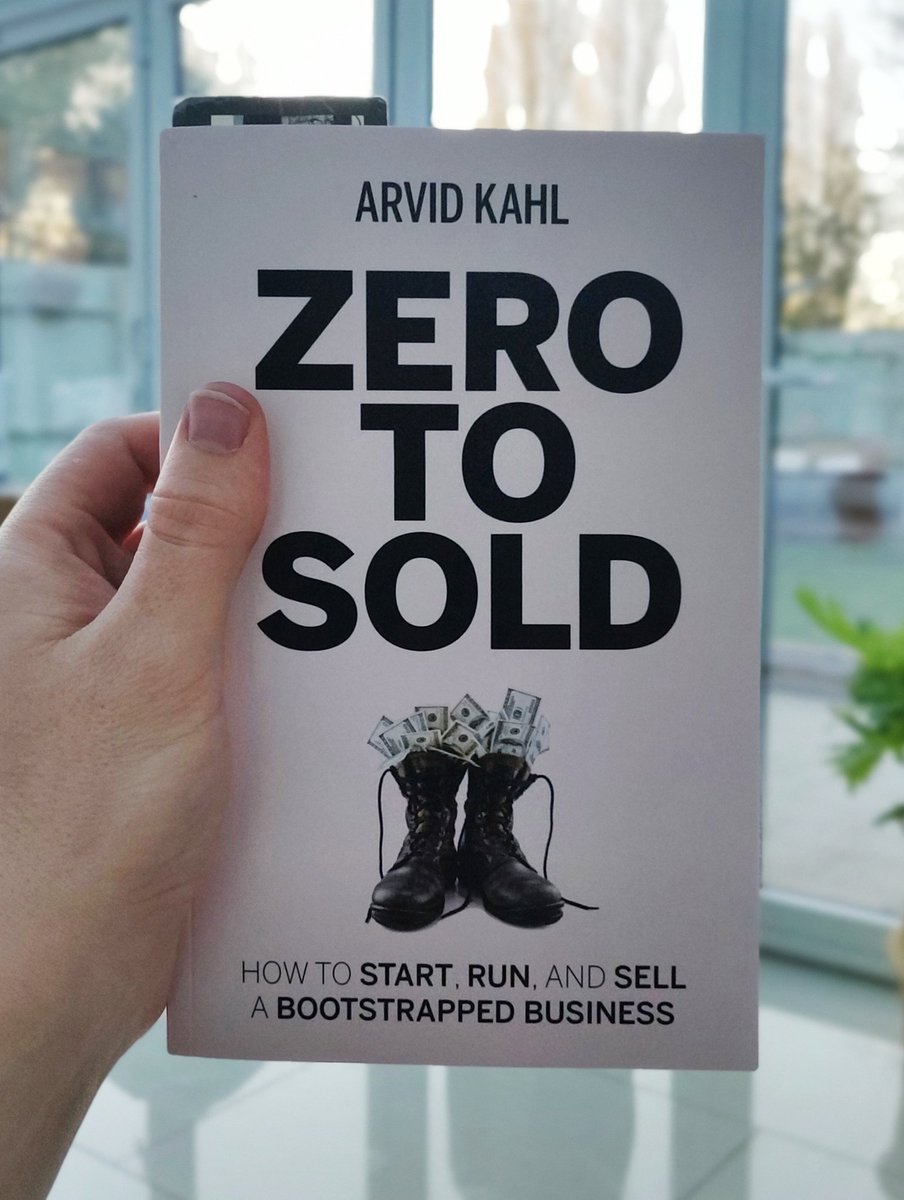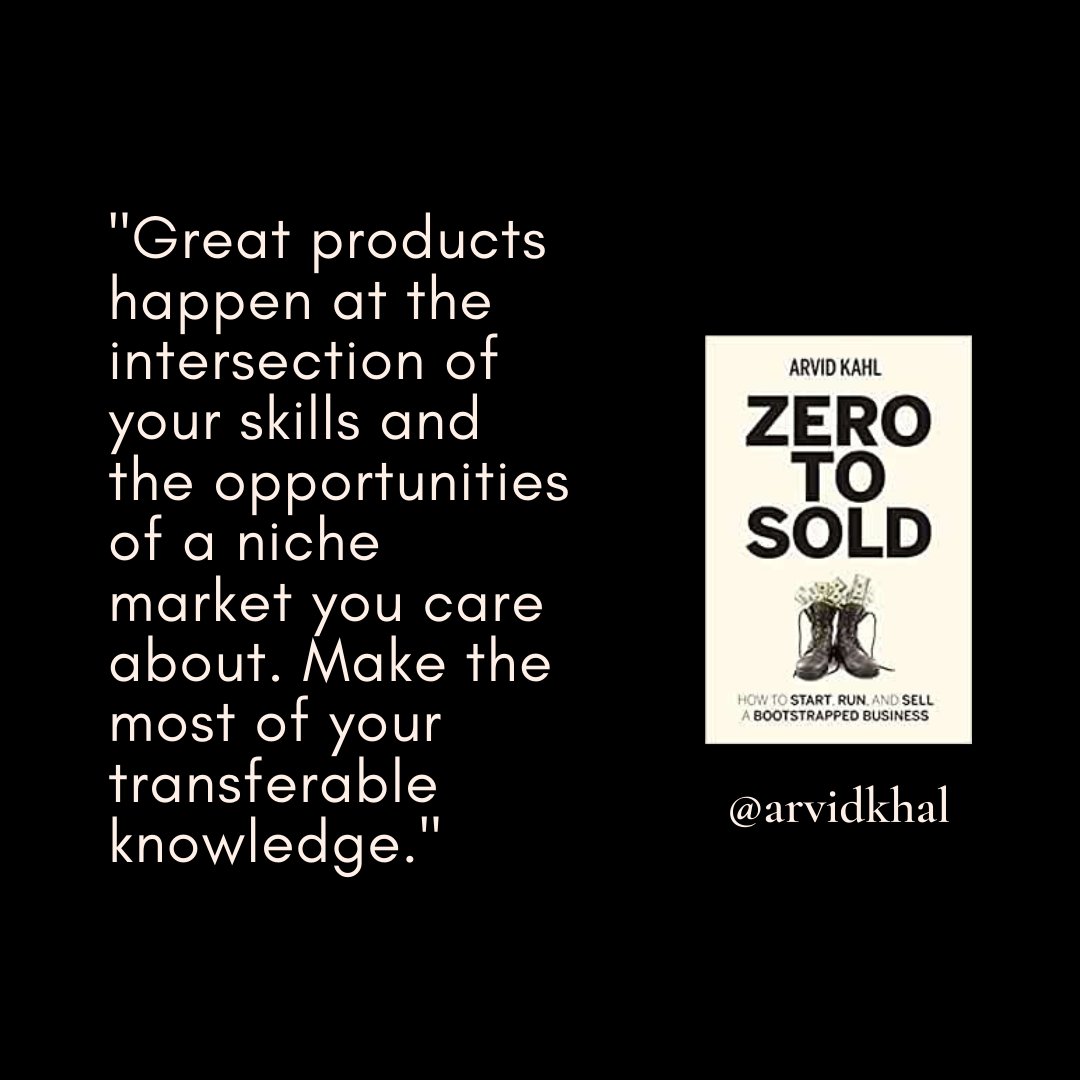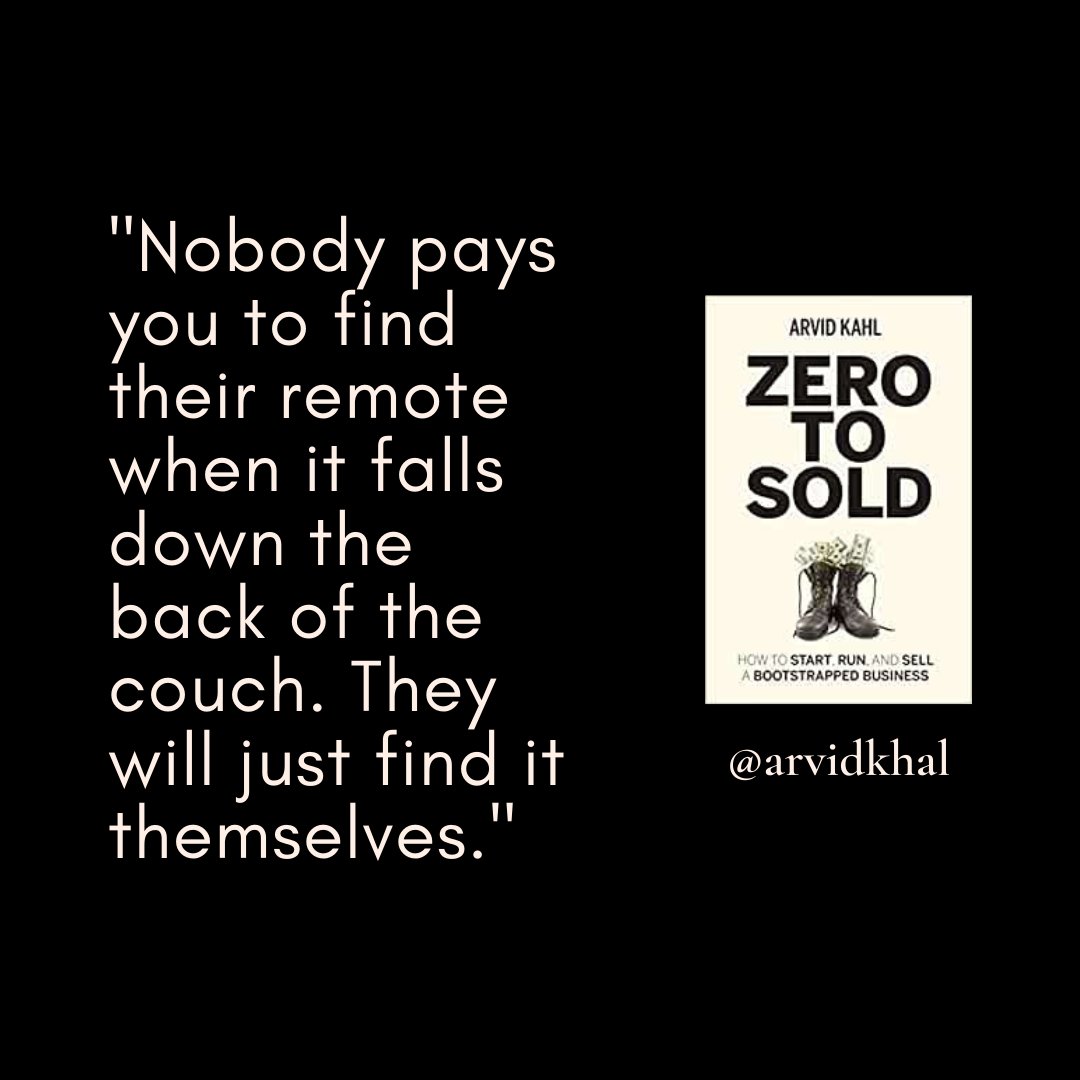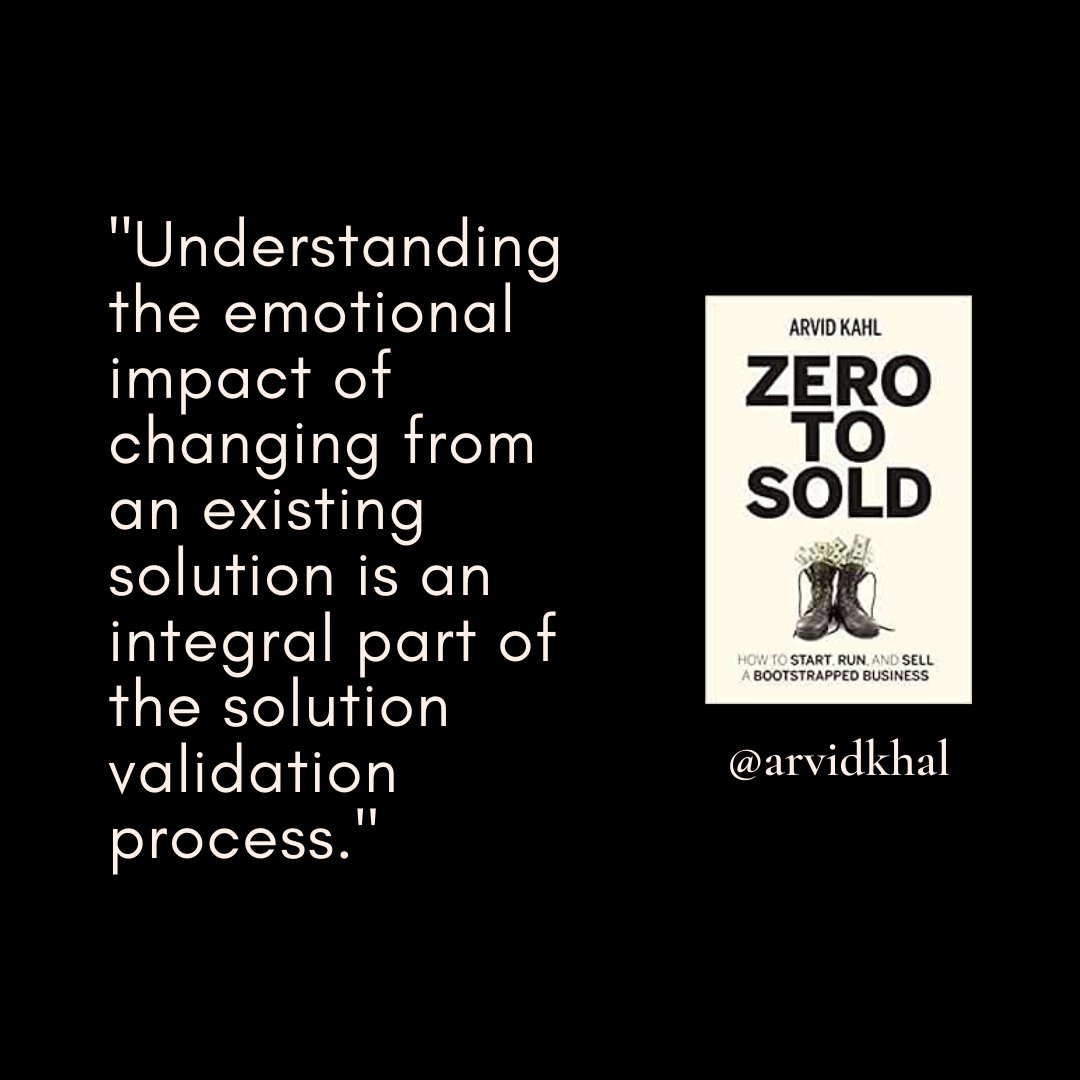I& #39;ll tweet my learnings
A thread
I& #39;m applying most of these learnings to my upcoming #EdTech startup.
First off, focussing on the market.
I have a fair understanding of the market as I know several small organisations quite well who would be the long-term target for the paid version of the SaaS.
First off, focussing on the market.
I have a fair understanding of the market as I know several small organisations quite well who would be the long-term target for the paid version of the SaaS.
In fact, I work *in* the industry in question.
I& #39;m aiming to use this as my unfair advantage (as Arvid recently said to me!) https://abs.twimg.com/emoji/v2/... draggable="false" alt="😎" title="Lächelndes Gesicht mit Sonnenbrille" aria-label="Emoji: Lächelndes Gesicht mit Sonnenbrille">
https://abs.twimg.com/emoji/v2/... draggable="false" alt="😎" title="Lächelndes Gesicht mit Sonnenbrille" aria-label="Emoji: Lächelndes Gesicht mit Sonnenbrille">
But, ok. I may see a problem clearly because I work in the sector, but is it a https://abs.twimg.com/emoji/v2/... draggable="false" alt="💥" title="Symbol für eine Kollision" aria-label="Emoji: Symbol für eine Kollision"> CRITICAL
https://abs.twimg.com/emoji/v2/... draggable="false" alt="💥" title="Symbol für eine Kollision" aria-label="Emoji: Symbol für eine Kollision"> CRITICAL  https://abs.twimg.com/emoji/v2/... draggable="false" alt="💥" title="Symbol für eine Kollision" aria-label="Emoji: Symbol für eine Kollision"> problem?
https://abs.twimg.com/emoji/v2/... draggable="false" alt="💥" title="Symbol für eine Kollision" aria-label="Emoji: Symbol für eine Kollision"> problem?
I& #39;m aiming to use this as my unfair advantage (as Arvid recently said to me!)
But, ok. I may see a problem clearly because I work in the sector, but is it a
Well, the pain point I want to help improve is something that learners in the UK *have* to do as part of their specific type of programme (yes I& #39;m keeping it vague at the moment!)
 https://abs.twimg.com/emoji/v2/... draggable="false" alt="💼" title="Aktenkoffer" aria-label="Emoji: Aktenkoffer"> It& #39;s a legislative requirement.
https://abs.twimg.com/emoji/v2/... draggable="false" alt="💼" title="Aktenkoffer" aria-label="Emoji: Aktenkoffer"> It& #39;s a legislative requirement.
 https://abs.twimg.com/emoji/v2/... draggable="false" alt="✅" title="Fettes weißes Häkchen" aria-label="Emoji: Fettes weißes Häkchen"> It has to be done.
https://abs.twimg.com/emoji/v2/... draggable="false" alt="✅" title="Fettes weißes Häkchen" aria-label="Emoji: Fettes weißes Häkchen"> It has to be done.
So that& #39;s good for me, right?
Also, anecdotally and from personal experience I know it is often a struggle.
Something that tends to be left until the end (when that& #39;s definitely the worst way to do it).
It& #39;s painful and stressful and feels like a box ticking exercise.
Also, anecdotally and from personal experience I know it is often a struggle.
Something that tends to be left until the end (when that& #39;s definitely the worst way to do it).
It& #39;s painful and stressful and feels like a box ticking exercise.
What if I could gamify the process so learners actually *want* to do it.
Better yet, they& #39;ll be doing it without even realising they& #39;re doing it.
 https://abs.twimg.com/emoji/v2/... draggable="false" alt="😎" title="Lächelndes Gesicht mit Sonnenbrille" aria-label="Emoji: Lächelndes Gesicht mit Sonnenbrille">
https://abs.twimg.com/emoji/v2/... draggable="false" alt="😎" title="Lächelndes Gesicht mit Sonnenbrille" aria-label="Emoji: Lächelndes Gesicht mit Sonnenbrille">
But woah there Jon.
Who would be paying for this? How big is the market? And how can I validate the need beyond anecdotes?
Better yet, they& #39;ll be doing it without even realising they& #39;re doing it.
But woah there Jon.
Who would be paying for this? How big is the market? And how can I validate the need beyond anecdotes?
Figure out the market size
The training organisations I would be targeting have to be on a government managed register.
It& #39;s public.
You can download a CSV of all the company names.
There are 2000+ of these organisations.
Nice
Some of those organisations will be too large for me: a small number of national leaders who will likely have their own tech.
The remainder, as long as they& #39;re active, should be prime targets. https://abs.twimg.com/emoji/v2/... draggable="false" alt="🎯" title="Volltreffer" aria-label="Emoji: Volltreffer">
https://abs.twimg.com/emoji/v2/... draggable="false" alt="🎯" title="Volltreffer" aria-label="Emoji: Volltreffer">
The remainder, as long as they& #39;re active, should be prime targets.
Reach out to more of these organisations and have a structured conversation with them about the identified problem.
In the process, new critical problems might be identified.
I can also start to ask how valuable a solution would be (i.e. price points)
More learnings and actions to follow.
Here& #39;s Arvid& #39;s book on Amazon* in case you want to check it out.
Arvid told me Amazon was the best place to get a physical copy https://abs.twimg.com/emoji/v2/... draggable="false" alt="👍🏻" title="Daumen hoch (heller Hautton)" aria-label="Emoji: Daumen hoch (heller Hautton)">
https://abs.twimg.com/emoji/v2/... draggable="false" alt="👍🏻" title="Daumen hoch (heller Hautton)" aria-label="Emoji: Daumen hoch (heller Hautton)">
* affiliate link https://www.amazon.co.uk/Zero-Sold-Start-Bootstrapped-Business/dp/3982195705?dchild=1&keywords=zero+to+sold&qid=1619118354&sprefix=zero+to+sold&sr=8-1&linkCode=ll1&tag=netwatch-21&linkId=28260600a378136b361abe15f1f81eb1&language=en_GB&ref_=as_li_ss_tl">https://www.amazon.co.uk/Zero-Sold...
Here& #39;s Arvid& #39;s book on Amazon* in case you want to check it out.
Arvid told me Amazon was the best place to get a physical copy
* affiliate link https://www.amazon.co.uk/Zero-Sold-Start-Bootstrapped-Business/dp/3982195705?dchild=1&keywords=zero+to+sold&qid=1619118354&sprefix=zero+to+sold&sr=8-1&linkCode=ll1&tag=netwatch-21&linkId=28260600a378136b361abe15f1f81eb1&language=en_GB&ref_=as_li_ss_tl">https://www.amazon.co.uk/Zero-Sold...
"Great products happen at the intersection of your skills and the opportunities of a niche market you care about. Make the most of your transferable knowledge."
- @arvidkahl
This is just razor sharp https://abs.twimg.com/emoji/v2/... draggable="false" alt="⚡" title="Hochspannungszeichen" aria-label="Emoji: Hochspannungszeichen">
https://abs.twimg.com/emoji/v2/... draggable="false" alt="⚡" title="Hochspannungszeichen" aria-label="Emoji: Hochspannungszeichen">
- @arvidkahl
This is just razor sharp
On problem intensity  https://abs.twimg.com/emoji/v2/... draggable="false" alt="👇🏻" title="Rückhand Zeigefinger nach unten (heller Hautton)" aria-label="Emoji: Rückhand Zeigefinger nach unten (heller Hautton)">
https://abs.twimg.com/emoji/v2/... draggable="false" alt="👇🏻" title="Rückhand Zeigefinger nach unten (heller Hautton)" aria-label="Emoji: Rückhand Zeigefinger nach unten (heller Hautton)">
"Nobody pays you to find their remote when it falls down the back of the couch. They will just find it themselves."
Unless you& #39;re Apple and you just released AirTags https://abs.twimg.com/emoji/v2/... draggable="false" alt="😝" title="Schielendes Gesicht mit Zunge" aria-label="Emoji: Schielendes Gesicht mit Zunge">
https://abs.twimg.com/emoji/v2/... draggable="false" alt="😝" title="Schielendes Gesicht mit Zunge" aria-label="Emoji: Schielendes Gesicht mit Zunge">
"Nobody pays you to find their remote when it falls down the back of the couch. They will just find it themselves."
Unless you& #39;re Apple and you just released AirTags
Questions to ask (B2BC) prospects: see pages 86-89 of the print book. https://www.amazon.co.uk/Zero-Sold-Start-Bootstrapped-Business/dp/3982195705?dchild=1&keywords=arvid+kahl&qid=1619298959&sprefix=arvid&sr=8-1&linkCode=ll1&tag=netwatch-21&linkId=9ec4821db7c1b26eb268bd252062ba0e&language=en_GB&ref_=as_li_ss_tl">https://www.amazon.co.uk/Zero-Sold...
The exploratory conversations that startup founders should have with prospective customers are a bit like the participatory research involved in Action Research.
This is my academic brain joining up dots with the practical startup world!
Validate the solution(s) before building a product.
This happens by talking to prospects about your proposed solution and assessing the +/- impact and risks.
My take: iterate aggressively before you even touch any code.
"Understanding the emotional impact of changing from an existing solution is an integral part of the solution validation process."
 https://abs.twimg.com/emoji/v2/... draggable="false" alt="✅" title="Fettes weißes Häkchen" aria-label="Emoji: Fettes weißes Häkchen"> Engage your prospects
https://abs.twimg.com/emoji/v2/... draggable="false" alt="✅" title="Fettes weißes Häkchen" aria-label="Emoji: Fettes weißes Häkchen"> Engage your prospects
 https://abs.twimg.com/emoji/v2/... draggable="false" alt="✅" title="Fettes weißes Häkchen" aria-label="Emoji: Fettes weißes Häkchen"> Ask about their fears of change
https://abs.twimg.com/emoji/v2/... draggable="false" alt="✅" title="Fettes weißes Häkchen" aria-label="Emoji: Fettes weißes Häkchen"> Ask about their fears of change
 https://abs.twimg.com/emoji/v2/... draggable="false" alt="✅" title="Fettes weißes Häkchen" aria-label="Emoji: Fettes weißes Häkchen"> Ask about painful experiences with other solutions
https://abs.twimg.com/emoji/v2/... draggable="false" alt="✅" title="Fettes weißes Häkchen" aria-label="Emoji: Fettes weißes Häkchen"> Ask about painful experiences with other solutions
 https://abs.twimg.com/emoji/v2/... draggable="false" alt="✅" title="Fettes weißes Häkchen" aria-label="Emoji: Fettes weißes Häkchen"> Avoid causing new problems!
https://abs.twimg.com/emoji/v2/... draggable="false" alt="✅" title="Fettes weißes Häkchen" aria-label="Emoji: Fettes weißes Häkchen"> Avoid causing new problems!
Hope you& #39;re enjoying my tweets on "Zero to Sold" by @arvidkahl.
More to follow as I continue to glean actionable insights for my own EdTech venture https://abs.twimg.com/emoji/v2/... draggable="false" alt="💪🏻" title="Angespannter Bizeps (heller Hautton)" aria-label="Emoji: Angespannter Bizeps (heller Hautton)">
https://abs.twimg.com/emoji/v2/... draggable="false" alt="💪🏻" title="Angespannter Bizeps (heller Hautton)" aria-label="Emoji: Angespannter Bizeps (heller Hautton)">
Have you already read it? Or reading it at the moment? Share your insights! https://abs.twimg.com/emoji/v2/... draggable="false" alt="💡" title="Elektrische Glühbirne" aria-label="Emoji: Elektrische Glühbirne">
https://abs.twimg.com/emoji/v2/... draggable="false" alt="💡" title="Elektrische Glühbirne" aria-label="Emoji: Elektrische Glühbirne">
And do https://abs.twimg.com/emoji/v2/... draggable="false" alt="🔁" title="Nach rechts und links zeigende Pfeile in offenem Kreis im Uhrzeigersinn" aria-label="Emoji: Nach rechts und links zeigende Pfeile in offenem Kreis im Uhrzeigersinn"> and
https://abs.twimg.com/emoji/v2/... draggable="false" alt="🔁" title="Nach rechts und links zeigende Pfeile in offenem Kreis im Uhrzeigersinn" aria-label="Emoji: Nach rechts und links zeigende Pfeile in offenem Kreis im Uhrzeigersinn"> and  https://abs.twimg.com/emoji/v2/... draggable="false" alt="❤️" title="Rotes Herz" aria-label="Emoji: Rotes Herz"> any tweets you enjoyed!
https://abs.twimg.com/emoji/v2/... draggable="false" alt="❤️" title="Rotes Herz" aria-label="Emoji: Rotes Herz"> any tweets you enjoyed!  https://abs.twimg.com/emoji/v2/... draggable="false" alt="🙏🏻" title="Gefaltete Hände (heller Hautton)" aria-label="Emoji: Gefaltete Hände (heller Hautton)">
https://abs.twimg.com/emoji/v2/... draggable="false" alt="🙏🏻" title="Gefaltete Hände (heller Hautton)" aria-label="Emoji: Gefaltete Hände (heller Hautton)">
More to follow as I continue to glean actionable insights for my own EdTech venture
Have you already read it? Or reading it at the moment? Share your insights!
And do

 Read on Twitter
Read on Twitter Bootstrapped startup lessons from "Zero to Sold" by @arvidkahl I& #39;ll tweet my learnings https://abs.twimg.com/emoji/v2/... draggable="false" alt="🤓" title="Nerd-Gesicht" aria-label="Emoji: Nerd-Gesicht"> and actions https://abs.twimg.com/emoji/v2/... draggable="false" alt="💪🏻" title="Angespannter Bizeps (heller Hautton)" aria-label="Emoji: Angespannter Bizeps (heller Hautton)"> as I read Arvid& #39;s book.A thread https://abs.twimg.com/emoji/v2/... draggable="false" alt="🧵" title="Thread" aria-label="Emoji: Thread">https://abs.twimg.com/emoji/v2/... draggable="false" alt="👇🏻" title="Rückhand Zeigefinger nach unten (heller Hautton)" aria-label="Emoji: Rückhand Zeigefinger nach unten (heller Hautton)">" title="https://abs.twimg.com/emoji/v2/... draggable="false" alt="🚀" title="Rakete" aria-label="Emoji: Rakete"> Bootstrapped startup lessons from "Zero to Sold" by @arvidkahl I& #39;ll tweet my learnings https://abs.twimg.com/emoji/v2/... draggable="false" alt="🤓" title="Nerd-Gesicht" aria-label="Emoji: Nerd-Gesicht"> and actions https://abs.twimg.com/emoji/v2/... draggable="false" alt="💪🏻" title="Angespannter Bizeps (heller Hautton)" aria-label="Emoji: Angespannter Bizeps (heller Hautton)"> as I read Arvid& #39;s book.A thread https://abs.twimg.com/emoji/v2/... draggable="false" alt="🧵" title="Thread" aria-label="Emoji: Thread">https://abs.twimg.com/emoji/v2/... draggable="false" alt="👇🏻" title="Rückhand Zeigefinger nach unten (heller Hautton)" aria-label="Emoji: Rückhand Zeigefinger nach unten (heller Hautton)">" class="img-responsive" style="max-width:100%;"/>
Bootstrapped startup lessons from "Zero to Sold" by @arvidkahl I& #39;ll tweet my learnings https://abs.twimg.com/emoji/v2/... draggable="false" alt="🤓" title="Nerd-Gesicht" aria-label="Emoji: Nerd-Gesicht"> and actions https://abs.twimg.com/emoji/v2/... draggable="false" alt="💪🏻" title="Angespannter Bizeps (heller Hautton)" aria-label="Emoji: Angespannter Bizeps (heller Hautton)"> as I read Arvid& #39;s book.A thread https://abs.twimg.com/emoji/v2/... draggable="false" alt="🧵" title="Thread" aria-label="Emoji: Thread">https://abs.twimg.com/emoji/v2/... draggable="false" alt="👇🏻" title="Rückhand Zeigefinger nach unten (heller Hautton)" aria-label="Emoji: Rückhand Zeigefinger nach unten (heller Hautton)">" title="https://abs.twimg.com/emoji/v2/... draggable="false" alt="🚀" title="Rakete" aria-label="Emoji: Rakete"> Bootstrapped startup lessons from "Zero to Sold" by @arvidkahl I& #39;ll tweet my learnings https://abs.twimg.com/emoji/v2/... draggable="false" alt="🤓" title="Nerd-Gesicht" aria-label="Emoji: Nerd-Gesicht"> and actions https://abs.twimg.com/emoji/v2/... draggable="false" alt="💪🏻" title="Angespannter Bizeps (heller Hautton)" aria-label="Emoji: Angespannter Bizeps (heller Hautton)"> as I read Arvid& #39;s book.A thread https://abs.twimg.com/emoji/v2/... draggable="false" alt="🧵" title="Thread" aria-label="Emoji: Thread">https://abs.twimg.com/emoji/v2/... draggable="false" alt="👇🏻" title="Rückhand Zeigefinger nach unten (heller Hautton)" aria-label="Emoji: Rückhand Zeigefinger nach unten (heller Hautton)">" class="img-responsive" style="max-width:100%;"/>
 " title=""Great products happen at the intersection of your skills and the opportunities of a niche market you care about. Make the most of your transferable knowledge." - @arvidkahlThis is just razor sharp https://abs.twimg.com/emoji/v2/... draggable="false" alt="⚡" title="Hochspannungszeichen" aria-label="Emoji: Hochspannungszeichen">" class="img-responsive" style="max-width:100%;"/>
" title=""Great products happen at the intersection of your skills and the opportunities of a niche market you care about. Make the most of your transferable knowledge." - @arvidkahlThis is just razor sharp https://abs.twimg.com/emoji/v2/... draggable="false" alt="⚡" title="Hochspannungszeichen" aria-label="Emoji: Hochspannungszeichen">" class="img-responsive" style="max-width:100%;"/>
 "Nobody pays you to find their remote when it falls down the back of the couch. They will just find it themselves."Unless you& #39;re Apple and you just released AirTags https://abs.twimg.com/emoji/v2/... draggable="false" alt="😝" title="Schielendes Gesicht mit Zunge" aria-label="Emoji: Schielendes Gesicht mit Zunge">" title="On problem intensity https://abs.twimg.com/emoji/v2/... draggable="false" alt="👇🏻" title="Rückhand Zeigefinger nach unten (heller Hautton)" aria-label="Emoji: Rückhand Zeigefinger nach unten (heller Hautton)">"Nobody pays you to find their remote when it falls down the back of the couch. They will just find it themselves."Unless you& #39;re Apple and you just released AirTags https://abs.twimg.com/emoji/v2/... draggable="false" alt="😝" title="Schielendes Gesicht mit Zunge" aria-label="Emoji: Schielendes Gesicht mit Zunge">" class="img-responsive" style="max-width:100%;"/>
"Nobody pays you to find their remote when it falls down the back of the couch. They will just find it themselves."Unless you& #39;re Apple and you just released AirTags https://abs.twimg.com/emoji/v2/... draggable="false" alt="😝" title="Schielendes Gesicht mit Zunge" aria-label="Emoji: Schielendes Gesicht mit Zunge">" title="On problem intensity https://abs.twimg.com/emoji/v2/... draggable="false" alt="👇🏻" title="Rückhand Zeigefinger nach unten (heller Hautton)" aria-label="Emoji: Rückhand Zeigefinger nach unten (heller Hautton)">"Nobody pays you to find their remote when it falls down the back of the couch. They will just find it themselves."Unless you& #39;re Apple and you just released AirTags https://abs.twimg.com/emoji/v2/... draggable="false" alt="😝" title="Schielendes Gesicht mit Zunge" aria-label="Emoji: Schielendes Gesicht mit Zunge">" class="img-responsive" style="max-width:100%;"/>
 Engage your prospectshttps://abs.twimg.com/emoji/v2/... draggable="false" alt="✅" title="Fettes weißes Häkchen" aria-label="Emoji: Fettes weißes Häkchen"> Ask about their fears of changehttps://abs.twimg.com/emoji/v2/... draggable="false" alt="✅" title="Fettes weißes Häkchen" aria-label="Emoji: Fettes weißes Häkchen"> Ask about painful experiences with other solutionshttps://abs.twimg.com/emoji/v2/... draggable="false" alt="✅" title="Fettes weißes Häkchen" aria-label="Emoji: Fettes weißes Häkchen"> Avoid causing new problems!" title=""Understanding the emotional impact of changing from an existing solution is an integral part of the solution validation process."https://abs.twimg.com/emoji/v2/... draggable="false" alt="✅" title="Fettes weißes Häkchen" aria-label="Emoji: Fettes weißes Häkchen"> Engage your prospectshttps://abs.twimg.com/emoji/v2/... draggable="false" alt="✅" title="Fettes weißes Häkchen" aria-label="Emoji: Fettes weißes Häkchen"> Ask about their fears of changehttps://abs.twimg.com/emoji/v2/... draggable="false" alt="✅" title="Fettes weißes Häkchen" aria-label="Emoji: Fettes weißes Häkchen"> Ask about painful experiences with other solutionshttps://abs.twimg.com/emoji/v2/... draggable="false" alt="✅" title="Fettes weißes Häkchen" aria-label="Emoji: Fettes weißes Häkchen"> Avoid causing new problems!" class="img-responsive" style="max-width:100%;"/>
Engage your prospectshttps://abs.twimg.com/emoji/v2/... draggable="false" alt="✅" title="Fettes weißes Häkchen" aria-label="Emoji: Fettes weißes Häkchen"> Ask about their fears of changehttps://abs.twimg.com/emoji/v2/... draggable="false" alt="✅" title="Fettes weißes Häkchen" aria-label="Emoji: Fettes weißes Häkchen"> Ask about painful experiences with other solutionshttps://abs.twimg.com/emoji/v2/... draggable="false" alt="✅" title="Fettes weißes Häkchen" aria-label="Emoji: Fettes weißes Häkchen"> Avoid causing new problems!" title=""Understanding the emotional impact of changing from an existing solution is an integral part of the solution validation process."https://abs.twimg.com/emoji/v2/... draggable="false" alt="✅" title="Fettes weißes Häkchen" aria-label="Emoji: Fettes weißes Häkchen"> Engage your prospectshttps://abs.twimg.com/emoji/v2/... draggable="false" alt="✅" title="Fettes weißes Häkchen" aria-label="Emoji: Fettes weißes Häkchen"> Ask about their fears of changehttps://abs.twimg.com/emoji/v2/... draggable="false" alt="✅" title="Fettes weißes Häkchen" aria-label="Emoji: Fettes weißes Häkchen"> Ask about painful experiences with other solutionshttps://abs.twimg.com/emoji/v2/... draggable="false" alt="✅" title="Fettes weißes Häkchen" aria-label="Emoji: Fettes weißes Häkchen"> Avoid causing new problems!" class="img-responsive" style="max-width:100%;"/>


